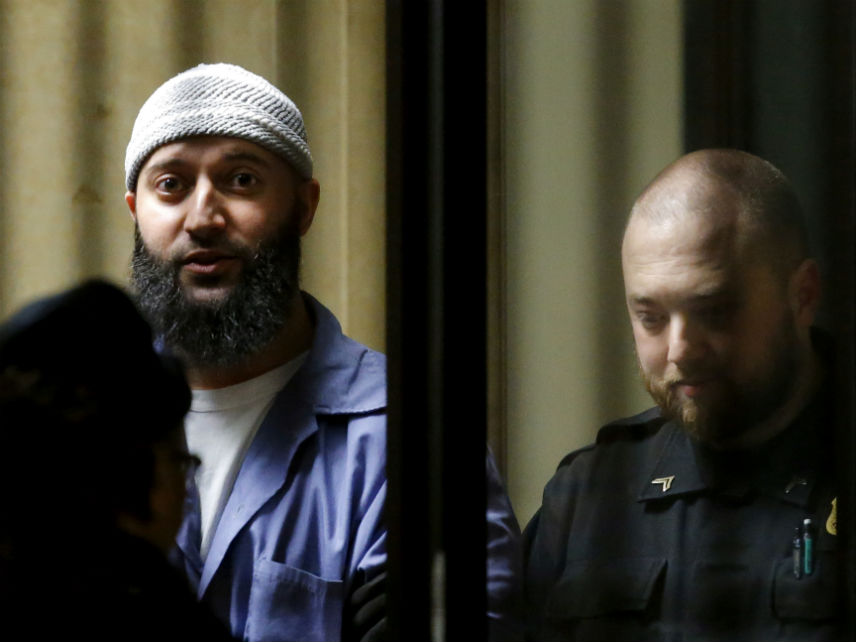Adnan Syed from Serial Is Getting a New Trial. He's One of the Lucky Few.
A high-profile podcast gave his case national attention, but almost all inmates who claim innocence are trapped in obscurity behind bars.

A Maryland appeals court ordered a new trial today for Adnan Syed, whose murder case was profiled on the smash-hit podcast Serial.
Syed was convicted in the 2000 murder of Hae Min Lee, his high school girlfriend, and sentenced to life in prison. The Serial podcast brought his case to national attention after it spent its first season painstakingly investigating the facts and theories behind Lee's murder, raising the question of Syed's innocence.
A Maryland circuit court judge vacated Syed's sentence in 2016 and ordered a new trial, after finding Syed had ineffective legal counsel in his original trial. His lawyer had failed to contact a key witness who said Syed was with her at their high school library at the time Lee was killed. The appeals court stayed that decision until the government could appeal.
In a 138-page ruling today, Chief Judge Patrick Woodward wrote that "trial counsel's deficient performance prejudiced Syed's defense because, but for trial counsel's failure to investigate, there is a reasonable probability that [Asia] McClain's alibi testimony would have raised a reasonable doubt in the mind of at least one juror about Syed's involvement."
Syed, who has always maintained his innocence, won the inmate lottery—insofar as anyone convicted of life in prison for murder can be considered to have lucked out.
It's exceedingly rare to have a murder sentence vacated. The criminal justice system places great value on finality, and there are a multitude of procedural hoops, unforgiving deadlines, and burdens of proof for inmates to meet when appealing a sentence. Add in recalcitrant district attorney's offices that often oppose DNA testing and introduction of new evidence that could lead to exonerations, and it's a small miracle when anyone succeeds.
Most inmates who claim innocence spend years chipping away at the appeals process in total obscurity, without the advantage of a well-heeled legal team, much less a popular true crime podcast, on their side.
For example, just this week, the Richard Phillips of Detroit was exonerated after spending 45 years in prison for murder. The Wayne County District Attorney's Office declined to re-prosecute him after a judge vacated his original sentence, concluding that a key witness in his 1971 trial had lied on the stand.
If you don't think there's more cases like Syed's out there, I have a desk drawer full of inmate letters I'd be happy to share.
Editor's Note: As of February 29, 2024, commenting privileges on reason.com posts are limited to Reason Plus subscribers. Past commenters are grandfathered in for a temporary period. Subscribe here to preserve your ability to comment. Your Reason Plus subscription also gives you an ad-free version of reason.com, along with full access to the digital edition and archives of Reason magazine. We request that comments be civil and on-topic. We do not moderate or assume any responsibility for comments, which are owned by the readers who post them. Comments do not represent the views of reason.com or Reason Foundation. We reserve the right to delete any comment and ban commenters for any reason at any time. Comments may only be edited within 5 minutes of posting. Report abuses.
Please to post comments


great value on finality
Memory holing is crucial when you're ruining lives.
I got paid $10438 a month ago by working on the web. Its a simple online activity to do and winning is more and superior to anything the general office work. I have discovered this activity a half year prior and begins gaining in my first month effortlessly. Everyone must attempt this activity at the present time by simply reorder the beneath site in program and afterward take after next subtle elements to begin procuring right now look here more
http://www.richdeck.com
The dissent is pretty well reasoned -- well worth reviewing. The bottom line is there was enormous evidence corroborating the key witness's testimony against Syed. (And the murder was committed either by that witness or Syed.)
Then why go to all that trouble to hide the alibi instead of refuting it?
It wasn't hidden. The original alibi letter submitted to the defense attorney for review by McClain during trial prep had no date or time. It was a bad alibi. Later, after conviction, McClain had an epiphany and recalled the date and time, lo and behold the time of the murder, now made public, and wrote another letter with the help of law student friend of Syed's family. This is the alibi. It's easily refuted (see the State's dissent) but it would likely need an evidentiary hearing to do so, which would require a retrial. Hence...
Start sharing!
Best article for those people whose accuse in the hit and run case. Quickbooks Support Number